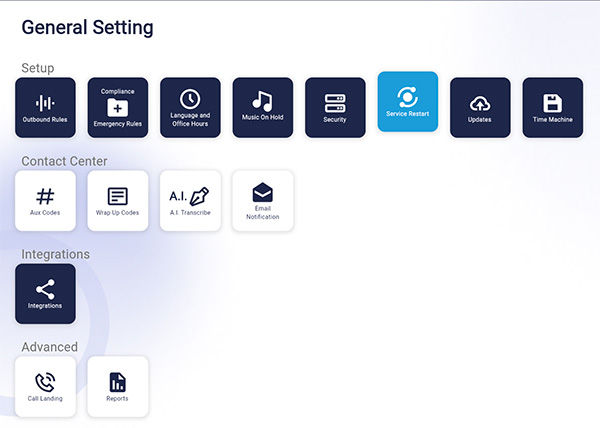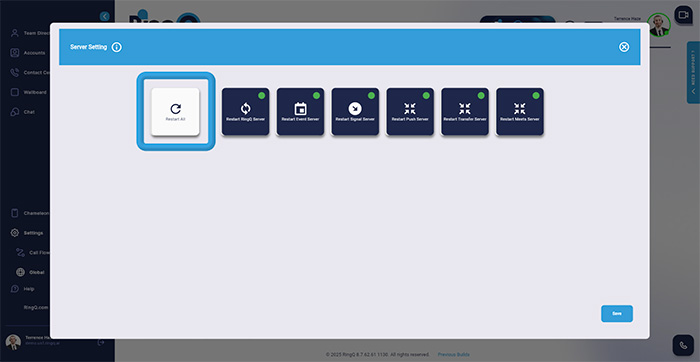Admin
Users & Call Controls
- Creating Extensions for Users
- Editing and Managing Extensions
- Creating Teams & Assigning Extensions
- Configuring Agent Status & BLF
- Managing Extension Schedules
- Managing User Roles
- Managing Call Controls
- Setting up Shared Parking
- Voicemails
- The BLF Function
- Configuring the Speed Dial
- Configuring the Busy Lamp Field (BLF)
Deployment Methods & System Requirements
Installation Guides
Service Restart
Introduction
This guide is intended for system administrators and covers how to safely restart services within the RingQ platform. Restarting specific services can help resolve performance issues, apply configuration changes, or recover from temporary faults—without affecting the entire system.
Options like Reset All, Restart RingQ Server, Restart Event Server, Restart Signal Server, Restart Push Server, Restart Transfer Server, and Restart Meet Server allow targeted recovery of services such as call routing, signaling, push notifications, transfers, and meetings. This helps apply configuration changes, resolve minor issues, and restore optimal performance without a full system reboot. However, restarting certain services may temporarily disrupt ongoing calls or sessions.
Follow this guide to ensure service restarts are performed efficiently and with minimal disruption to operations.
Reset Services

1. Login to your RingQ web app and go to “Settings” > “Global”.
2. Under General Settings, click on the “Service Restart” button.
Reset All

Reset All restarts every core RingQ service—RingQ Server, Event Server, Signal Server, Push Server, Transfer Server, and Meet Server. It’s a quick way to apply widespread updates or resolve multiple issues at once, but it will briefly interrupt all active calls, notifications, transfers, and meetings. Use during scheduled maintenance or low-traffic periods.
Restart RingQ Server
Refreshes the main server that runs core functions like call handling and user sessions. It’s used to apply major changes or fix system-wide issues. This restart can briefly interrupt ongoing calls, so it’s best done during low-traffic hours.
Restart Event Server
Refreshes the service that manages call events, logs, and real-time updates in RingQ. It’s useful when event data is delayed, missing, or not displaying correctly. Restarting this server has minimal impact on active calls but helps restore accurate system activity tracking.
Restart Signal Server
Refreshes the service that handles signaling between users and devices in RingQ, such as call ringing, answering, and hang-ups. It’s used to fix issues like delayed call notifications or unresponsive call actions. This may briefly affect call connectivity, so it should be used when necessary.
Restart Push Server
Refreshes the service responsible for delivering push notifications to RingQ mobile and desktop apps. It’s useful when users are not receiving call alerts, messages, or other real-time updates. Restarting this server has little to no impact on active calls but helps restore reliable notifications.
Restart Transfer Server
Refreshes the service that manages call transfers within RingQ, including blind and attended transfers. It’s used when transfers fail, lag, or don’t connect properly. Restarting this server may affect ongoing transfers, so it’s best done when call activity is low.
Restart Meet Server
Refreshes the service that powers RingQ’s meeting and conferencing features. It’s helpful when users experience issues joining meetings, poor audio/video quality, or dropped conference sessions. Restarting this server may temporarily interrupt ongoing meetings, so it should be done during off-peak hours when possible.
